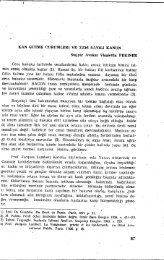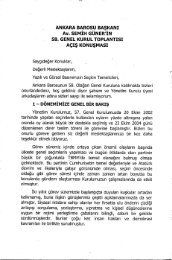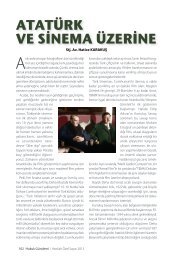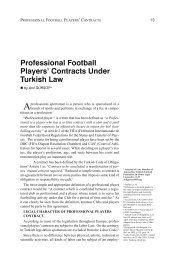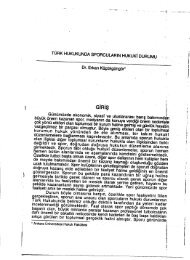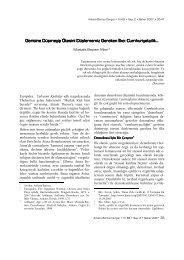The Turkish Cypriot Legal System from a Historical ... - Ankara Barosu
The Turkish Cypriot Legal System from a Historical ... - Ankara Barosu
The Turkish Cypriot Legal System from a Historical ... - Ankara Barosu
You also want an ePaper? Increase the reach of your titles
YUMPU automatically turns print PDFs into web optimized ePapers that Google loves.
<strong>The</strong> TuRkish CypRioT legal sysTem fRom a hisToRiCal peRspeCTiVe<br />
community to become the “<strong>Turkish</strong> Republic of Northern Cyprus.”<br />
<strong>The</strong> <strong>Turkish</strong> Federative State of Cyprus, which had preserved, with<br />
the Provisionary Article 1 of her Constitution the enforcability of<br />
the codes <strong>from</strong> the British period, codes enacted by the House of<br />
Representatives of the RoC until December 21, 1963, the <strong>Turkish</strong><br />
Community Assembly, Assembly of the Autonomous <strong>Turkish</strong> <strong>Cypriot</strong><br />
Provisionary Administration, and the Legislative Assembly of<br />
the Autonomous <strong>Turkish</strong> <strong>Cypriot</strong> Administration, had created a unified<br />
legal system with its codes adopted, amended and abolished by<br />
her Assembly. 85 . This legal system has come to be the core of the<br />
current legal system of the <strong>Turkish</strong> Republic of Northern Cyprus.<br />
In this respect, a few examples could be given for laws enacted by<br />
the Assembly of the Federative State and commonly found in the<br />
legal structure of all institutionalized political authorities referred to<br />
as “states”: "Referendum Law", “Political Parties Law”, “Land Registry<br />
and Cadastre Law”, "Motor Vehicles Law”, “Immovable Properties<br />
Law”, “Monetary and Exchange Affairs Law", “Public Servants<br />
Law”, “Military Zones Law”, “Banks Law”, “Social Insurance<br />
Law”, “Law on the Foundation of Security Forces”, “Retirement<br />
Law”, “Reserve Military Officer Law”, “Law on the Collection of<br />
Public Receivables”, "Court of Accounts Law”, and “Rent Law.” 86 A<br />
closer technical inspection of these laws enacted after 1974 makes it<br />
apparent that a majority of them were inspired by the laws of the Republic<br />
of Turkey. <strong>The</strong>refore it can be said that during the Federative<br />
State period, the <strong>Turkish</strong> <strong>Cypriot</strong> legal system gradually moved farther<br />
away <strong>from</strong> the Anglo-Saxon legal system and attained a mixed<br />
structure by reapproaching the <strong>Turkish</strong> legal system.<br />
However it should be underlined that the observation that the <strong>Turkish</strong><br />
<strong>Cypriot</strong> legal system has been shifting towards a mixed structure<br />
composed of Anglo-Saxon and <strong>Turkish</strong> legal systems, pertains to the<br />
substantive law rather than procedural law. In other words, the shift<br />
<strong>from</strong> Anglo-Saxon law to <strong>Turkish</strong> law has been in the field of substantive<br />
law, not the procedural law. On the exact contrary, the Federative<br />
State Assembly continued to remain loyal to the judicial structural<br />
and procedural laws of the RoC period by affirming the validity<br />
of the procedural laws <strong>from</strong> the British period, and complimenting<br />
them with other laws like the “Law on the High Judiciary Council”,<br />
“<strong>Legal</strong> Chamber Law”, and “Code of Courts.” We believe that, those<br />
who claim that the modern <strong>Turkish</strong> <strong>Cypriot</strong> legal system is based on<br />
the Anglo-Saxon legal system, reach this conclusion by taking into<br />
account the more conspicuous judicial structure and the procedural<br />
law. As the judicial structure formed in the Federative State period<br />
85 Kıbrıs Yasaları, p. 5.<br />
86 For the dates of entry into force of these codes and other codes enacted by the Federative State Assembly see COŞ-<br />
KUN, p. 257 et seq.<br />
111




